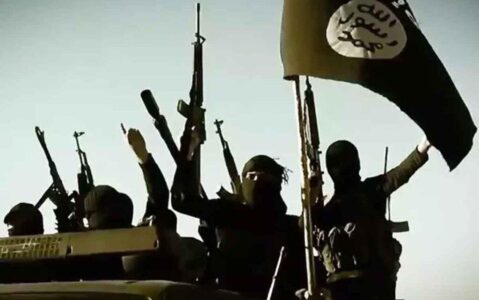
Islamic State-Khorasan province hits out at China-Pakistan
The Islamic State Khorasan Province has blasted China and the Taliban for maintaining close ties with each other. The ISIS-K also shared an image of the members of the Taliban praying alongside the ISI chief.
The ISIS-K called out the Taliban for considering the murder of Uyghur Muslims as an internal matter China, while it remained silent on the mass murders committed by Beijing’s proxies, Russia and Iran.
“The issue of extreme nationalism and tribalism, which has nothing to do with the Islamic System is ever present within the group. Love and hate depend on the tribe rather than being a Muslim,” the ISIS-K said.
While the outfit continued to suffer losses and many of its chiefs were killed over the past year, it has staged some very blatant attacks in Afghanistan. In November the group carried out an attack at the Kabul University in which 22 people were killed.
In the same month, the ISKP launched a mortar attack in a residential area in Kabul in which 8 people were killed. In May 2020, the ISKP killed 16 people at a maternity ward in Kabul which was run by the Doctors Without Borders Charity.
Last December, the outfit launched a rocket attack at the airport in Kabul. The outfit also carried out a car bomb attack outside a girl’s school in Kabul. 165 including 68 students were killed in the attack. The ISKP was also involved in the Kabul Gurudwara attack in which 25 people were killed.
The Taliban and the ISKP too have been at logger heads and have waged many battles for territory. The Taliban has come out victorious and has on several occasions told the ISKP that any battle fought in Afghanistan should be under it.
While the Taliban has taken over Afghanistan, the worry where the ISKP is concerned would be about projecting itself as a rejectionist group in Afghanistan.
A UN report said the Islamic State in Iraq and the Levant-Khorasan (ISIL-K) remains diminished from its zenith, following successive military setbacks that began in Jowzjan in summer 2018.
However, since June 2020, it has had an ambitious new leader, Shahab al-Muhajir , and it remains active and dangerous, particularly if it is able, by positioning itself as the sole pure rejectionist group in Afghanistan, to recruit disaffected Taliban and other militants to swell its ranks.
Member States have varying assessments of the extent of ISIL-K and al-Muhajir’s links with the Haqqani Network. Meanwhile, the Al-Sadiq office is co-located with ISIL-K in Afghanistan, pursuing a regional agenda in Central and South Asia on behalf of the ISIL core, the report also said.
The fact that the ISKP has drawn in disgruntled terrorists from other groups was seen in the appointment of its first chief in Afghanistan. The first leader of the ISKP was Hafiz Saeed Khan, a Pakistan national who was part of the Tehreek-e-Taliban.
Following his appointment, he brought in several from the TTP into the ISKP. Abdul Rauf Kadim, a former commander of the Taliban was appointed as the Khan’s deputy. Over the next couple of months several more from the TTK and the Lashkar-e-Islam joined the ISKP.
It was growing into a potent force in Afghanistan and there were defections into the ISKP from the Haqqani Network, Lashkar-e-Tayiba, Islamic Movement of Uzbekistan and Jamaat-ud-Dawa.
These developments are pointers that the ISKP will continue to position itself as a rejectionist group in Afghanistan and will pose a security risk in the near future as well.
Source: One India





